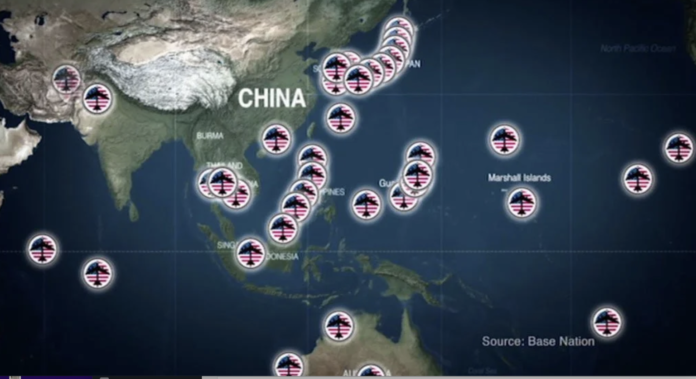Lessons for the Pacific from an American warship in the Red Sea
Last Thursday, USS Carney an American guided-missile destroyer shot down missiles and drones launched at Israel by Houthi militia based in Yemen. The ship shot down 14 drones and four cruise missiles over the Red Sea.
The incident provides lessons for people studying the nature of a potential conflict in the Pacific. The first lesson is about the proliferation of long-range precision-strike weapons. The Houthi are not a state in the conventional sense, they are a large armed group fighting against Saudi Arabia and Yemen’s governments. However, they could still muster the capability to launch long-range cruise missile and drone strikes against targets approx. 1800km away. Less than the distance between Brisbane and New Caledonia or between Townsville (an Australian garrison town in North Queensland) and Solomon Islands or Port Moresby.
The second lesson is that as long-range precision-strike weapons proliferate they will influence conflict in the South West Pacific. These weapons suit this region with its vast distances, archipelagos and small populations. Forces can disperse over large areas, striking swiftly and disappearing before moving to new locations. Further, the nature of long-range precision-strike weapons and the geography of the Pacific provide opportunities for deniable kinetic attacks either by supplying these weapons to proxies or by using small hard to detect conventional forces.
The third lesson, is the importance of air-defence in future conflict. Specifically, that it needs be able to track and hit small slow targets like drones as well as fast missiles, and needs to be deployed en masse so that it is not swamped. The United States is already developing this capability and both of its new formations the Marine Littoral Combat Regiment and the Multi Domain Task Force have considerable air-defence capability. Australia’s recent defence review diverted funds away from conventional armour and artillery systems to long-range precision-strike missiles and air-defence instead.
Finally, for smaller less well-funded militaries the proliferation of cheap, long-range strike drones provides more opportunity to challenge interventions by larger powers. The easy deployment of peace-keeping forces in Bougainville in 1998, the International Force for East Timor (INTERFET) in 1999 or the Regional Assistance Mission Solomon Islands (RAMSI) in 2002 could not be challenged by any of the warring factions because the nations leading the coalition, Australia and New Zealand had a complete military overmatch. A future intervention of this type anywhere in Melanesia or the South West Pacific, could now potentially be contested using swarms of cheap suicide drones launched from points across the archipelago. A much more difficult military prospect and one that the militaries of the Pacific need to plan to address.
Even the BBC is watching the military build-up in Northern Australia!
Australia’s development as a regional military hub was reported on by the BBC on 25 October, BBC World publishing an article about Darwin’s increasing military importance and its potential to play a key role in future conflict. The full article can be found here – https://www.bbc.com/news/world-australia-67166799
In summary, the article highlighted the development of military bases and logistics facilities in and around Darwin. A city that is well-located to support United States, Australian or allied forces deploying to Melanesia or the South West Pacific.
Australia is pouring money and resources into garrisoning and fortifying its northern shores and the BBC articles also discusses America’s commitment to this project stating that:
“…in recent years it has promised about $2bn for base upgrades and new facilities. In Darwin, that includes a mission planning and operations centre and 11 jet fuel storage tanks. A couple of hours south – at the Tindal air base – storage hangers for nuclear-capable bomber planes and a huge ammunition bunker will be built.”
The military build-up is part of a wider strategy to deter Chinese aggression in the Pacific. By supporting partners and allies to increase their own military capabilities and by dispersing its forces across bases in many countries the United States disincentivises a move to kinetic war-fighting. This is not just about developing powerful local allied forces but about dispersing United States assets to make a crippling pre-emptive strike harder to achieve. In Darwin, the United States now has a permanent Marine unit, B52 bombers and a range of other assets that join other forward based assets in Japan, South Korea, Philippines and across islands like Hawaii, Guam and Palau. Essentially, if an enemy wants to cripple American military power in the Pacific it needs to simultaneously strike many different and very widely separated locations.
Further, dispersal of American military forces across many nations creates a complex web of international relationships that make it harder for China to take kinetic action because there are more likely to be unforeseen consequences. Military planners like predictability and certainty, and a web of alliances and partnerships is makes it more difficult to interpret potential reactions.
Finally, Australia provides a large and well-resourced base for projecting power north. Darwin and Townsville provide the airfields, ports, accommodation and logistics that would be very useful as a ‘jumping off point’ for a large American force deploying into Melanesia, South East Asia or the South West Pacific.
The BBC article also highlighted local people’s concerns about the Darwin’s militarisation. And, in my opinion every democratic nation’s military policy should be developed transparently with a well-informed public. It is important that voters across all Pacific nations are aware of defence issues and actively engage in discussing them, because unfortunately the region is at risk of becoming a more dangerous place.
Pacific media part of Sino-American competition.
Hybrid war produces many strange situations and Sino-American competition in the Pacific took another interesting turn this week. The United States committing to support independent media in the Pacific. In recent years concern has been expressed about China’s influence on local media outlets, including recently in Solomon Islands.
During a visit to Sydney this week, United States Under Secretary for Diplomacy, Elizabeth Allan spoke about America’s commitment to free and independent media in the Pacific region. Part of the Under Secretary’s visit involved opening the new Pacific hub for the Digital Communication Network (DCN). A State Department sponsored collaborative platform to support independent media, that the department describes as follows:
“DCN Global is an independent, multi-disciplinary community of digital professionals and emerging leaders organized as a social enterprise supported by the U.S. Department of State. This collaborative network seeks solutions that address challenges to democracy and the information space.”
The statement’s description may be jargon riddled and hard to understand but America is making an important investment in maintaining access to the ‘information domain.’ The term ‘information domain’ is military speak for being able to influence public opinion, shaping it before and during a military campaign. Possibly to justify activity or to undermine an enemy’s will to fight. By investing in the freedom of regional media the United States is making sure that it has access to the ‘hearts and minds’ of people in the Pacific.
Melanesian update
A regular update on the Pacific’s least reported trouble spot; Melanesia.
Exercise Pacific Partnership 2023 – Papua New Guinea
United States, Australian and Japanese military personnel have just finished an exercise in Papua New Guinea. The exercise tested response to humanitarian emergencies and involved delivery of considerable medical support to local communities. While, exercising joint planning and operational control.
Papua New Guinea population predicted to reach 21 million by 2050
Last week, the United Nations Population Fund published projections that Papua New Guinea’s population will reach 21 million people by 2050.
This population growth is significant and means that average age of Papua New Guinea’s population will decrease increasing many social tensions because the nation’s economy is unlikely to grow at the same rate so the standard of living will probably deteriorate.
Papua New Guinea already suffers many difficulties associated with weak government and large population growth will exacerbate the situation.
Vanuatu cyclone response
Royal Australian Airforce aircraft are supporting to Vanuatu as it recovers from the impact of Cyclone Lola last week. Australia’s proximity to Vanuatu means that it can support the nation building goodwill and providing humanitarian assistance.





Maybe I am being cynical but I suspect that “The United States committing to support independent media in the Pacific” will be of the Fox News type.
“The military build-up is part of a wider strategy to deter Chinese aggression in the Pacific.” Ben Morgan.
There’s that bullshit word again.
Here let me correct it;
‘The military build-up is part of a wider strategy for war against Chinese aggression in the Pacific.’
Deterrence has never worked, never will work
We need to stop fooling ourselves, make no mistake, war is coming.
If history tells us anything, it is this:
Imperialists cannot be deterred. Economic and military expansion is not a choice for growth economies, it is an imperative. This is especially true in times of global economic recession/depression.
https://www.weforum.org/press/2023/01/chief-economists-say-global-recession-likely-in-2023-but-cost-of-living-crisis-close-to-peaking/
New Zealand’s best economic and military strategy in this new clash of economic empires is to stand aloof from the coming bloodfest. and cut all military links with all the blood soaked imperialists seeking to carve up the Pacific in their own interests. We need to find the courage to stand up and declare New Zealand as an independent neutral state. A ‘Switzerland’ of the South Seas.
We are being groomed for war
I hate how militaries try to disguise their war plans with talks about deterrence. The only ones being fooled and being led along by the nose into a war, are the public. And that goes for the public on both sides of the imperialist divide.
War and the forcible redivision of the Pacific region is for the benefit of the wealthy economic shareholders on both sides of the imperialist divide, and for the military industrial complex that sustains and protects their interests.
Most of us who don’t hold shares or investments do not benefit from war.
Let’s say it again. 1-2-3-4 We don’t want your bloody war!
As the elephant in the room grows larger, the courage to address it grows smaller.
Ben Morgan almost talks about the crisis in Middle East.
“Last Thursday, USS Carney an American guided-missile destroyer shot down missiles and drones launched at Israel by Houthi militia based in Yemen. The ship shot down 14 drones and four cruise missiles over the Red Sea.” Ben Morgan
And here I was thinking that military people valued courage and valor.
The ICC and the UNICJ were swift to condemn the Russian Federation imperialist aggression, when the Russian Federation was committing war crimes in Ukraine. The total silence practiced by these same international legal bodies over war crimes being committed in Gaza, does more to undermine the international rules based order, that these international legal bodies claim to support, than anything Russia or China does.
A medical convoy of ambulances organised to evacuate patients from the Al Shifa hospital to Egypt through the Rafah crossing for treatment not available in Gaza, has been deliberately bombed by the Israeli forces. Israel admits to attacking the convoy but claims that the ambulances were being used by terrorists.
https://www.reuters.com/world/middle-east/health-ministry-gaza-says-israel-targeted-convoy-ambulances-leaving-al-shifa-2023-11-03/
Reports are coming in that the Israeli bombers and offshore navy artillery are also targeting civilians fleeing Gaza city on the Al Rashid Highway to the South.
https://www.newarab.com/news/israeli-strikes-hit-gazas-al-shifa-hospital-al-rashid-road
Western milbloggers claim that we are preparing to go to war with Russia and China to protect the International Rule Based Order.
Where is this vaunted International Rules International Order when a Western aligned nation is committing war crimes tantamount to genocide?
Where is the International Criminal Court?
Where is the United Nations International Court of Justice?
Where are the Western milbloggers who analyse in depth every aspect of Russian Federation aggression in Ukraine, and Chinese imperialist intentions in the Pacific?
Those who deliberately hold their silence are complicit. And you know it.
We read and hear a lot of how we in the West, (us) must prepare to wage war to protect the Rule Based International Order.
What is really meant is that we are prepared to wage war to protect Western global hegemony, nothing to do with protecting rules, or law, or even order, just protecting naked power and privilege, no matter the human cost or chaos.
Israel’s bloodlust shows international law is ‘a manipulated series of norms’
Renowned International Law Professor Richard Falk says Western leadership becomes “self-righteous” to enforce international law “when it’s in their interest” while in other cases, they remain silent.
https://www.trtworld.com/middle-east/qanda-israels-bloodlust-shows-international-law-is-a-manipulated-series-of-norms-15614861?
…”Many objective observers have noted that how Israel is using force against Gaza constitutes an ongoing genocide, which is itself considered the most serious of international crimes and, again, deserves a consensus of action by the UN to stop this kind of violent abuse of state power,” Falk said. …
…In moments like these, when a staggering death toll of civilians isn’t significant enough to move the international community to use the same language of condemnation and criticism it has employed against Russia in light of the Ukraine conflict, Western leadership fails to convince the world about the uniformity of its much-touted “rules-based order”….